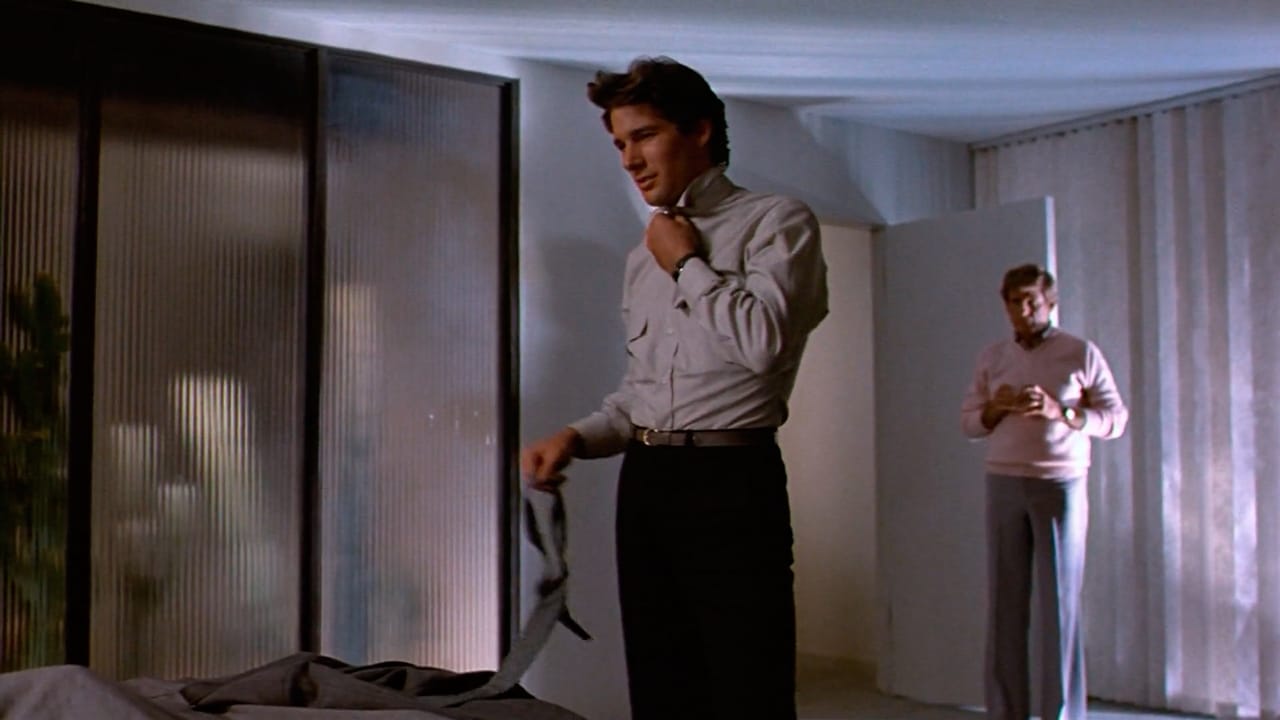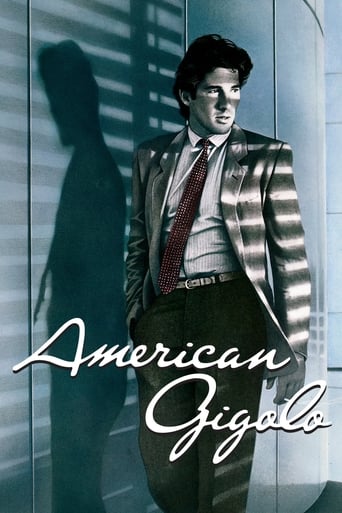



Why so much hype?
not as good as all the hype
it is the rare 'crazy' movie that actually has something to say.
View MoreI think this is a new genre that they're all sort of working their way through it and haven't got all the kinks worked out yet but it's a genre that works for me.
View More"American Gigolo" is a character study wrapped around a murder mystery with neither aspect particularly satisfying.The story is centred on Julian Kaye, a high price male escort played by Richard Gere whose specialty is pleasing middle-aged women. Julian's clients are supplied by two contacts including a pimp named Leon. Julian takes a break from the middle-aged women for an extra-curricular affair with Michelle Stratton, played by Lauren Hutton, the wife of a prominent senator.When Leon arranges for Julian to provide a service for a client who wants to watch Julian make love to his wife, she is found murdered after his visit. A policeman, detective Sunday, played by Hector Elizondo, investigates Julian who receives no help from his other clients who could provide him with an alibi.Although this is one of Richard Gere's most important early movies, it suffers from the fact that none of the characters are particularly engaging – including Julian. For a man who supposedly makes his living providing stimulation to rich, middle-aged women, Julian seems remarkably devoid of charisma. We do not see very much actual gigoloing, which is probably just as well because Julian is so into himself and his clothes that the first five minutes of lovemaking would probably involve him finding a padded coat hanger for his jacket, folding his trousers and laying out fresh underwear to put on when he was finished.In the early part of his career, Richard Gere had a tendency to use too much "method" at unexpected moments. The scene where he destroys his apartment and his car looking for planted evidence is over-the-top and distracting. If it were a metaphor for dissatisfaction with his life it would be almost acceptable, but he shows little conscience about his parasitic lifestyle at any other time in the movie.Hector Elizondo's cigar chomping detective is a strange creation. At one point, after Julian criticises his dress sense, he turns up at the precinct in a snappy new suit. Although he seems sympathetic to Julian, he disappears from the story before this aspect is fully explored.The electronic score by Gorgio Moroder is the classic sound of the late 70's when symphonic scores for this kind of film had all but disappeared. His score for "American Gigolo" dates the movie far more than the full hairstyles, checked pants and hatchbacks speeding along the freeway.The fragmented last half-hour of "American Gigolo" caps an already flabby movie. When Michelle Stratton provides Julian not only with an alibi, but also true love, you feel that the filmmakers clutched at this ending. To have worked, there needed to be some growth in Julian's character. The audience is left with the feeling that Julian would not have made the same kind of sacrifice for Michelle. It is this emptiness at its centre that is the defining quality of "American Gigolo".
View MoreDreadful movie. Richard Gere plays Julian a high-priced male prostitute. He does a job one night and soon finds out his client was murdered. (BTW, we never see what happened that night) He's being framed and a police detective (Hector Elizondo) seems hellbent on arresting him and throwing him in jail. The only person who can help him is one of his clients--Michelle (Lauren Hutton). However she's married and her husband knows nothing of Julian.This movie starts off great with Blondie's song "Call Me" booming out over the opening credits. After that it quickly falls apart. The story is dull, the characters uninteresting and the sex scenes are stupid and overly arty. The only remotely interesting part is when Gere casually strolls out of bed totally nude (you get back and front shots). It also doesn't really end--it just stops. It seems like they're trying to make a point but what it is totally escapes me. Boring and uninvolving. A 1 all the way.
View MoreGiorgio Moroder's signature synths followed by Deborah Harry's instantly recognisable new wave classic, Call Me, opens up American Gigolo as we see a pretty suave 80s Richard Gere in a black Cadilliac driving along the beachside. Gere has all the trappings of a wealthy 80s lifestyle so usually romanticised in a Bruckheimer production but the film establishes in its first few scenes that Gere is pretty much a buck for hire with little sway over his Aryan madam. This form of bait and switch appears throughout the movie, with Gere appearing in control and pretty cool at first and then as a total whore. The dichotomy between these two personas plays a big part of the film's plot as Julian K., Gere, becomes entangled in a murder investigation of a trick who is the wife to a wealthy S&M aficionado and learns that he should question the many friendships he's procured during his career as a loverboy. Lauren Hutton plays a random woman that Gere meets and develops into the film's love interest after one of the most minimalist sex scenes in an 80s film. The set production, music, acting and story is all very connotative of the eighties. Apartments are gray or salmon coloured with minimalist artwork and expensive vases and silver blocky stereo systems - it's clear with some scenes, including one where Gere hangs upside down to do some crunches, that the set design heavily influenced the mise-en-scene of Mary Harron's adaptation of American Psycho. Moroder's various compositions of Blondie's Call Me highlight the continuing descent of Julian k. as the chorus becomes more melancholic and ominous - it's all very suspenseful from an eighties perspective. Some may find the final scenes slightly ridiculous and most likely unrealistic, but one should remember that American Gigolo was produced by Jerry Bruckheimer and even on the tail end of New Hollywood, the film does show caution in its dark themes as not to alienate mainstream audiences. I definitely felt the material was pretty subdued for a film written and directed by Taxi Driver's Paul Schrader. However, it doesn't matter as the film is effective as a time capsule of the seedier side of the eighties.
View MoreWith the decline of the moralistic Production Code, female prostitutes began to appear in films from the early sixties like "Irma la Douce" and "Breakfast at Tiffany's", although they generally fitted that old literary archetype of the "tart with a heart", and by the end of the decade we had, in "Midnight Cowboy", a mainstream film dealing with the subject of male prostitution. "American Gigolo", made in 1980, is another on the same controversial theme. Julian Kaye is a heterosexual male prostitute working in Los Angeles who makes his living having sex with wealthy women for money. It is evidently a job which pays well as he lives in an upmarket apartment, drives a Mercedes SL, wears clothes by Armani and has expensive tastes in hi-fi equipment. Julian, however, is a tart without a heart; he is a selfish and superficial man who lacks any affection for the women he sleeps with, seeing them only as a source of income, until he meets Michelle Stratton, the unhappily married wife of a rising politician. Michelle becomes a regular client and begins to develop deeper feelings for him. Julian learns that another of his clients, the wife of a wealthy financier, has been murdered. To make matters worse, the police regard him as a prime suspect and he is unable to provide an alibi. He realises that he is being framed to protect the real murderer and is forced to go on the run to discover who is responsible. The theme of a man wrongly accused of a crime is a familiar thriller trope; it frequently occurs, for example, in the works of Alfred Hitchcock. "American Gigolo", however, is quite different in style to any of Hitchcock's films. It is sometimes regarded as the second installment of Paul Schrader's "lonely man" trilogy, following "Taxi Driver" for which Schrader wrote the script but was directed by Martin Scorsese, and preceding "Light Sleeper" which, like "American Gigolo", was both written and directed by Schrader. I have never seen "Light Sleeper", but there are certainly parallels between "American Gigolo" and "Taxi Driver". Both have prostitution as a central theme and both have a main character who is a loner, despite the obvious differences between Richard Gere's affluent, dandyish Julian and Robert de Niro's seedy working-class loser Travis Bickle. Like Bickle, Julian is cold and emotionally detached, and both films similarly take a cold-eyed, detached view of their subject-matter. Julian may be the victim of undeserved suspicion, but Schrader never evokes sympathy for him in the way that Hitchcock probably would. (Hitchcock generally intended the audience to identify emotionally with the heroes of his "man unjustly accused" films like Cary Grant in "North by North-West" or Henry Fonda in "The Wrong Man"; "Frenzy" is perhaps an exception). Julian is too cold and self-obsessed to claim our sympathy; there is a sense that he has earned his living in an immoral way and paid the price, that he has played with fire and got burnt after coming up against people more vicious than he is. At the end of the film he is only saved by a false alibi- he has learned to fight fire with fire and lies with more lies, an ironic ending which, I suspect, would not have appealed to Hitchcock. The film is very much of its time, celebrating the contemporary styles of the late seventies and early eighties, represented by Julian's car, clothes and tastes in interior decoration. (This impression is strengthened by the use of the pop music of the era, such as Blondie's "Call Me", on the soundtrack). As the film progresses, however, the outward symbols of his sleazy success seem to drop away; previously immaculately dressed, he now appears unkempt and unshaven and is seen driving a cheap rented car. Gere was not the first choice for the role of Julian- that was, apparently, John Travolta- but he made the part his own. As in a number of his best films- other examples include "An Officer and A Gentleman", "No Mercy" and "Chicago"- Gere's performance is characterised by a certain self-confident swagger bordering on arrogance. (The same is to some extent true of "Pretty Woman", but there Edward's outward swagger hides inner uncertainties and self-doubt). Lauren Hutton is also good as Michelle who has to choose between her growing feelings for Julian on the one hand and her husband 's political career and her own reputation on the other."American Gigolo" is in form a thriller, but seen purely as such it is not altogether a success. There is insufficient tension, the emotional temperature is too cool and the ending is unclear. Where it does succeed is as a cool, stylish look at the underside of American society in the early eighties. 7/10
View More